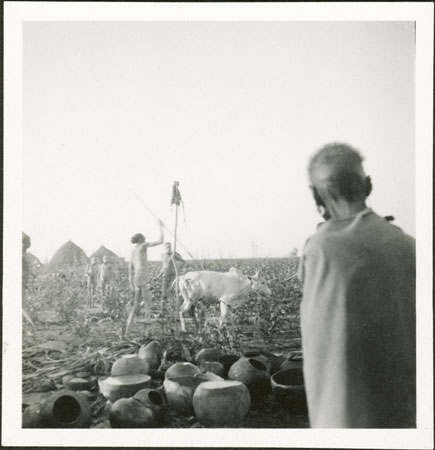Nuer colwic ceremony

58 x 55 mm | Print gelatin silver
Date of Print:
Unknown
Previous PRM Number:
EP.N.V.98
Previous Other Number:
02 2
Accession Number:
1998.355.247.2
Description:
A man making an invocation with raised spear as he sacrifices an ox for the spirit of a girl killed by lightning next to her shrine.
This seems to be the occasion witnessed by Evans-Pritchard in 1936 when relatives gathered to make sacrifice at a colwic shrine for a girl called Nyakewa.
The shrine is visible in the foreground just beyond the beer vessels, consisting of a low earth mound with a shrine-stake (riek) planted in it and part of a sacrifice placed on top.
Nyakewa was considered to have become a colwic, a spirit taken directly by God.
This specific intervention by the divine was considered so dangerous to all associated with the deceased that sacrifice is made by all relatives, and a special shrine erected with offerings.
This sacrifice was by Nyakewa's senior maternal uncle, whose short invocation was witnessed by Evans-Pritchard on the morning following the main ceremony.
His photographs of the main sacrifices the previous evening were affected by poor light.
In all more than twenty animals were sacrificed over several days.
Photographer:
Edward Evan Evans-Pritchard
Date of Photo:
1936 October - November
Region:
[Southern Sudan] Wahda Nyueny
Group:
Nuer Leek Karlual
NamedPerson:
Nyakewa
Publication History:
Contemporary Publication - A cropped version of this image was reproduced as Plate IX (facing page 208) of E.
E.
Evans-Pritchard's
Nuer Religion
(Oxford University Press 1974 [1957]) with the caption "Invocation".
PRM Source:
Edward Evan Evans-Pritchard
Acquired:
Donated 1966
Other Owners:
E. E. Evans-Pritchard Collection
Class:
Religion , Ritual , Food and Drink , Animal Husbandry
Keyword:
Shrine , Vessel , Animal Cattle
Activity:
Ritual Activity
Event:
Sacrifice , Ceremony
Documentation:
Original catalogue lists in Manuscript Collections. Additional material in related documents files. [CM 27/9/2005]
Primary Documentation:
Accession Book Entry [p.
98] 1966.27 [1 - 24] G[ift] PROFESSOR E.
E.
EVANS-PRITCHARD; INST.
OF SOCIAL ANTHROPOLOGY, 51 BANBURY RD.
OXFORD 1966.27.1-16 S.
SUDAN.
NUER TRIBE.
Sixteen negative albums containing negatives
and
prints of photographs taken by donor during field-work.
All listed in albums.
Added Accession Book Entry - [p.
98 in right hand column, in pencil] Catalogue room.
Manual Catalogues [index taken from album book V, ms ink] - 98. sacrificial invocation
Note on print reverse ms pencil - "02 2 col wic [numerous printer's marks]" & ms ink "Plate IX Book V no 97" a took place in the same village as the possession of Galuak by the spirit nai , an event that took place during E-P's fieldwork in Nyueny village among the Karlual in 1936. [Chris Morton 28/6/2004]
Manual Catalogues [index taken from album book V, ms ink] - 98. sacrificial invocation
Note on print reverse ms pencil - "02 2 col wic [numerous printer's marks]" & ms ink "Plate IX Book V no 97" a took place in the same village as the possession of Galuak by the spirit nai , an event that took place during E-P's fieldwork in Nyueny village among the Karlual in 1936. [Chris Morton 28/6/2004]
Other Information:
Image context - In E.
E.
Evans-Pritchard's Nuer Religion (Oxford University Press 1974 [1957]), page 56-7, he notes that 'I had the opportunity in 1936 to witness this ceremony when it was held for a girl called Nyakewa, the daughter of Rwacar, among the western Nuer.
During the afternoon the women of the village collected in the garden of the dead girl's home to make beer, for it is the custom on this occasion for the women to work together instead of each in her own home...
The ceremony began in the late afternoon in the homestead where Nyakewa was killed, that of her mother Nyaruithni and of her brother Malith, an uninitiated boy...
At dawn on the following morning the dead girl's senior maternal uncle sacrificed a bull on behalf of the maternal kinsfolk.
It was first castrated in his byre because animals are not sacrificed entire.
The uncle made a short invocation before spearing it.' On page 59, E-P mentions that the colwic ceremony for Nyakewa took place in the same village as the possession of Galuak by the spirit nai, an event that took place during E-P's fieldwork in Nyueny village among the Karlual in 1936.
[Chris Morton 28/6/2004]
Recorder:
Christopher Morton [28/6/2004] [Southern Sudan Project]

